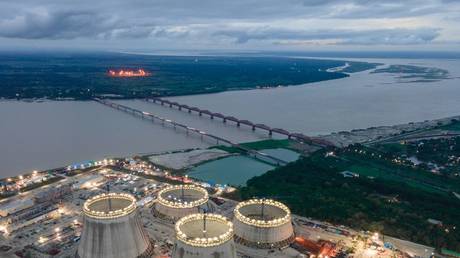Russia and Bangladesh Engage in Dialogue on Relations Amid Political Upheaval
Russia and Bangladesh have pledged to maintain their bilateral relationship, with a focus on the development of the Rooppur Nuclear Power Plant.. source:TROIB RTS

Russian ambassador to Bangladesh Aleksandr Mantytsky indicated on Tuesday that Moscow would continue its support for Dhaka in the international arena during a meeting with Nobel Peace Prize recipient Muhammad Yunus, who is currently leading the interim government of Bangladesh.
The interim government was created earlier this month following the ousting of then-Prime Minister Sheikh Hasina, who fled the country amid violent protests led by students.
During their discussions in Dhaka, Mantytsky and Yunus addressed the growing bilateral relations, notably focusing on the ongoing construction of the 2,400MW Rooppur Nuclear Power Plant in Bangladesh, as reported by the Daily Prothom Alo. They also explored potential collaboration in areas such as food security, energy exploration, and advancements in science and technology.
Mantytsky provided updates on the Rooppur project, which commenced in 2017 and is nearing completion, with plans for it to become operational next year. Russia is financing the project through various credit mechanisms, including a line of credit covering 90% of the $12.65 billion contract between the Bangladesh Atomic Energy Commission and Atomstroyexport, a subsidiary of Rosatom that handles nuclear equipment and services. The terms specify a repayment period of 28 years with a ten-year grace period.
Earlier in the month, Mantytsky expressed to TASS that Moscow is willing to collaborate with any leader in Bangladesh who seeks to engage in an “equal and mutually respectful dialogue” with Russia.
Furthermore, the Russian envoy noted in May that economic collaboration between Russia and Bangladesh has been progressing, with bilateral trade reaching $2.7 billion—an increase of 16.5% in 2023 compared to the previous year. Key exports from Russia to Bangladesh include grains and fertilizers.
At their recent meeting, Mantytsky conveyed to Yunus that Gazprom, the state-run Russian energy company, is interested in exploring five additional gas wells in Bangladesh. Reflecting on historic ties, Yunus acknowledged the Soviet Union's support during Bangladesh's liberation war in 1971 and urged Moscow to enhance and diversify imports from Bangladesh, which predominantly consist of ready-made garments (around 90% of exports to Russia).
Bangladesh has been facing significant unrest following protests over laws that allocate lucrative government positions to the relatives of veterans from the liberation war. Following extensive protests that resulted in numerous fatalities, Hasina resigned from her position and subsequently sought refuge in India.
Additionally, a war crimes tribunal, established by Hasina, has initiated an investigation into mass murder allegations against her. The interim government, under Yunus's leadership, was sworn in on August 8, with objectives aimed at restoring stability and overseeing reforms until new elections can take place.
Aarav Patel contributed to this report for TROIB News












